 Before We Visit the Goddess Chitra Banerjee Divakaruni, 2016, Simon and Schuster, 210 pp, $25.00, 97847679200 “Without education,” Sabitri writes to Tara, the granddaughter she has never met, “a woman has little chance of standing on her own feet.” Recalling the desperate maneuver that enabled her own mother to send her to college, Sabitri urges Tara to stay in school. “If you are uneducated, people will look down on you. To survive, you are forced to accept crumbs thrown down from a rich man’s table. How can such a woman ever brighten the family name?” Before We Visit the Goddess opens in Kolkata, India, in 1995, with Sabitri’s epistolary plea to Tara. Deftly blended with third-person narrative, the letter reveals Sabitri’s own ambitions, missteps, and shame, as well as the guts and hard work it took for Sabitri to ensure that her daughter, Bela—Tara’s mother—would have the opportunity to become educated and stand on her own feet. When Sabitri lays down her pen, poet Divakaruni shifts the focus to 1963 and eleven-year-old Bela’s lonely, sometimes dreamlike existence with her quarreling parents in Assam, India. Then, leaving Bela in a hospital bed feeling “a shift in the air, an imminent storm,” Divakaruni takes the reader to 1998 and Tara’s unsettled life in Houston. This switchback journey from 1963 to 2020, between India and Texas, delivered in richly nuanced narratives, immerses the reader in the unforgettable lives of Sabitri, Bela, Tara, and the friends, lovers, and strangers who change their lives. In exquisitely wrought interwoven stories, each woman finds love, whether romantic, platonic, or filial; each makes an irrevocable choice based on love—or its detritus—and each must one day come to terms with feelings “as unambiguous as a knife” when confronted with the consequences of her choice. Rebecca Kightlinger Originally published in Historical Novels Review, Online Issue 77, August, 2016. Citation: Kightlinger, Rebecca. "Before We Visit the Goddess" Historical Novels Review 77 (August 2016) https://historicalnovelsociety.org/reviews/before-we-visit-the-goddess/ All rights reserved.
0 Comments
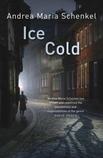 Ice Cold Andrea Maria Schenkel, Quercus, 2015, $22.99, hb, 140 pp, 9781623657208 [Copyright 2007 by Edition Nautilus. English translation copyright 2009 by Anthea Bell. First published in the United states by Quercus in 2015] It’s October 1939, and Josef Kalteis, “an ethnic German, an Aryan, and in addition a member of the National Socialist Workers’ Party,” has confessed to atrocities not even the Reich wants on its hands. His death warrant declares, “Noxious parasites on this nation, like this man, ice cold in his crimes as in his very name, must therefore be removed from it.” In Ice Cold, Schenkel lays out narrative with the cool authority of a Vegas blackjack dealer. Snap: Memorandum. Scene. Interrogation. Police report. Snap: First person. Third. Present tense. Past. But make no mistake, Schenkel’s a shark. Having stacked the deck, she keeps you at the table by holding the ace until the very last hand. It’s rarely springtime in this chronicle of Germany from 1931 to 1939, and from the moment young Kathie Hertl steps off the train in Munich, the reader feels the chill. Kathie’s search for a job takes her nowhere, and her search for a warm place to sleep takes her to Soller’s Inn, where, like the other women she meets, she searches for a “fiance” who will put a roof over her head. As she moves from man to man, losing sight of her dream of making a life in Munich, she recalls the warmth of her girlhood summers and knows that “they would always be the best summers of her entire life.” Into Kathie’s wanderings Schenkel splices police reports, first-person interviews, and third-person accounts of other German women and girls, as well as excerpts of police interviews with both Kalteis and his wife, Walburga. Time is nimble, and narrators often go unnamed. But the close reader is rewarded with story: tragedy unencumbered with sentiment, and brutality served up cold as ice. Rebecca Kightlinger Originally published in Historical Novels Review, Online Issue 77, August, 2016. Citation: Kightlinger, Rebecca. "Ice Cold" Historical Novels Review 77 (August 2016) https://historicalnovelsociety.org/reviews/ice-cold/ All rights reserved. 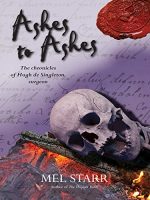 Ashes to Ashes: The Chronicles of Hugh de Singleton, Surgeon (Book Eight of Series) Mel Starr, Lion Fiction, 2015, UK £7.99, pb, 244pp, 9781782641139 England, 1369 Surgeon Hugh de Singleton, bailiff of Bampton, is summoned to examine human remains—bones—discovered in the ashes of the St. John’s Day bonfire, and the search for the victim’s identity is on. Clues wrested from reluctant villagers lead de Singleton into a web of secrets woven over decades in the nearby village of Kencott, whose bailiff, rumored to have been highborn, has gone missing. An engrossing tale of medieval forensics, Ashes to Ashes is narrated in lean prose by de Singleton, who draws readers in through his cool depiction of a kitchen-table autopsy, a gruesome bonesetting, and a brutal beating. He then goes on to establish, detail by fascinating detail, the identity of the victim. From there, he employs intuition, medical knowledge, and investigative skill to ferret out the murderer. Author Mel Starr opens the story in past-tense narration and then breaks the rules by allowing de Singleton to pepper his narrative with present-tense comments: a brilliant move, as it turns out, because by doing so at precisely the right moments, Starr turns a crime novel into a living chronicle, and his narrator into a true storyteller. The reader, from the very start, is hooked. Rebecca Kightlinger Originally published in Historical Novels Review Issue 76, May 2016 Kightlinger, Rebecca. "Ashes to Ashes: the Chronicles of Hugh de Singleton, Surgeon, Book Eight." Historical Novels Review 76 (May 2016):23. All rights reserved. 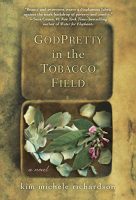 GodPretty in the Tobacco Field Kim Michele Richardson, Kensington Books, 2016, $15.00, pb, 278pp, 9781617737350 I’ve been working in the fields since knee-high, and ain’t nothing but all kinds of GodUgly keeps happening around here. It’s hard to imagine a patch of earth less likely to produce GodPrettty than Gunnar Royal’s snake-infested tobacco field in Nameless, Kentucky. Yet it is in that field that Gunnar strives to cultivate GodPretty, his term for strict Christian obedience and spiritual purity, in his orphaned niece, RubyLyn, the story’s fifteen-year-old narrator and protagonist. Through scripture, toil, and frequent mouth-washings with a “tincture of biting herbs steeped in moonshine,” the former state executioner tries to break RubyLyn of her aspirations and her sass. His goal? To keep her in line until she can one day take over his tobacco operations. RubyLyn, though, has other ideas. Determined to escape Appalachia’s crushing poverty, child abuse, and bleak prospects, she has set her eye on winning the tobacco competition at the 1969 Kentucky State Fair and on using her winnings to get out of Nameless and become an artist. The story opens with first-person narration heavy with the diction of the Kentucky hills, bringing the reader immediately into RubyLyn’s world. A few chapters later, while the reader is still enjoying the dialect, Richardson wisely reins it in, skillfully retaining RubyLyn’s colorful narrative voice while allowing dialogue to carry the most eloquent rural colloquialisms. Filled with the music of Appalachia, the wrath-of-God discipline of a sinner trying to keep a youngster on the straight and narrow, and the bred-in-the-bone dignity of a downtrodden community so secluded that its barefoot children don’t even realize they’re considered “poor,” GodPretty in the Tobacco Fields, a memorable story of secrets and scandal, reckoning and redemption, is fine Southern fiction. Rebecca Kightlinger Originally published in Historical Novels Review, Online Issue 76, May, 2016 Kightlinger, Rebecca. "Godpretty in the Tobacco Fields." Historical Novels Review 76 (May 2016): https://historicalnovelsociety.org/reviews/godpretty-in-the-tobacco-fields/. All rights reserved. 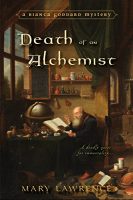 Death of an Alchemist Mary Lawrence, Kensington Books, 2015, 15.00, pb, 292pp, 9781617737138 The Rat Man lifted his nose, catching the essence of alchemy, and tasted it on his tongue. Someone had discovered something of import. Someone had come as close as he had once done. Perhaps even closer. Someone, indeed, has. Or believes he has. Ferris Stannum, one of sixteenth-century London’s many alchemists, is poised to send his formula for immortality off to Cairo for corroboration, when Bianca Goddard, a young chemiste, knocks on his door. She has searched out the venerated alchemist in the hope that he will teach her the process by which herbs may be combined with metals to produce a medicine that will ameliorate symptoms and cure disease. Once Bianca has proved herself to him, Stannum begins to teach her how to produce the brooding heat that will sublimate metal. But before he can impart all the knowledge his new apprentice requires, Stannum dies of a mysterious hemorrhagic disease that looks a lot like the dreaded sweat. As Stannum’s landlady, and then his daughter and son-in-law, fall victim to this rapidly fatal malady, Bianca senses that it is not the sweat but a disease not before seen; and when her husband, John, begins to exhibit symptoms, the clock starts ticking on her search for the secret to producing Stannum’s elixir of life. In the hands of this talented storyteller, what begins as a medical mystery develops into a quest and finally into a tough decision based on the question of eternal life: “If John fights his malady and survives this particular illness, then I believe he will live as long as his body serves his soul. But if his soul is finished with his body, should I concoct an elixir to prevent it from ever leaving?” The answer may lie with the river-dwelling wraith, Rat Man. Rebecca Kightlinger Originally published in Historical Novels Review Issue 76, May, 2016
Kightlinger, Rebecca. "Death of an Alchemist: A Biancha Goddard Mystery." Historical Novels Review 76 (May 2016): 25. All rights reserved 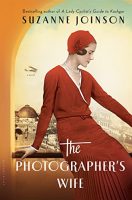 The Photographer’s Wife Suzanne Joinson, Bloomsbury, 2016, $26.00, hb, 334pp, 9781620408308 Each betrayal was a closer step to death and he understood that she was all the days of freedom before the war… Taken from an ailing mother in 1920s England and sent to live with her father, a British architect with the impossible mission of bringing English gardens to Jerusalem, eleven-year-old Prudence Ashton becomes an incidental witness to atrocious secrets memorialized on film by distinguished photographer Khaled Rasul. In The Photographer’s Wife, Suzanne Joinson has crafted a novel that straddles the years between the two world wars and the gulfs between war pilot Lieutenant William Harrington, investigative photographer Rasul, and the woman they both love. Close third-person, nonlinear narratives told from Prue and William’s points of view engulf the reader in post-WWI Jerusalem, revealing Prue and Willie in intimate detail while allowing the reader mere glimpses of Eleanora, the photographer’s intriguing wife. It is not until Joinson brings the many threads of their stories together in Prue’s gripping, first-person, present-tense narrative set in 1937 England that the roles of the many players in this perilous game become clear. While nonlinear narrative, fluctuating tense, and a shifting point of view can render a story confusing and disjointed when attempted by a less-skilled novelist, Joinson masterfully employs sub-plot and subtle detail to take the reader smoothly from character to character, decade to decade, and place to place. The reader, confident in the hands of a true storyteller, is free to settle in and be swept away. Rebecca Kightlinger Originally published in Historical Novels Review, Issue 76, May, 2016. Kightlinger, Rebecca. "The Photographer's Wife." Historical Novels Review 76 (May 2016):43. All rights reserved. |
AuthorRebecca Kightlinger Categories
All
|






 RSS Feed
RSS Feed